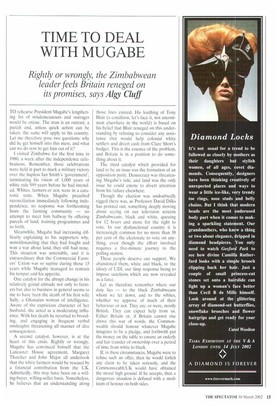TIME TO DEAL WITH MUGABE
Rightly or wrongly, the Zimbabwean
leader feels Britain reneged on its promises, says Algy Cluff
TO rehearse President Mugabe's lengthening list of misdemeanours and outrages would be otiose. The man is an outcast, a pariah and, unless quick action can be taken, the same will apply to his country. Let me therefore pose two questions: why did he get himself into this mess, and what can we do now to get him out of it?
I visited Zimbabwe for the first time in 1980, a week after the independence celebrations. Remember, those celebrations were held in part to mark a military victory over the hapless Ian Smith's 'government', terminating his vision of 1,000 years of white rule 989 years before he had intended. Whites, farmers or not, were in a catatonic state. When Mugabe preached reconciliation immediately following independence, no response was forthcoming from the farming community — no attempt to meet him halfway by offering parcels of land, training programmes and so forth.
Meanwhile, Mugabe had increasing difficulty explaining to his supporters why, notwithstanding that they had fought and won a war about land, they still had none. This situation was untenable, and it is extraordinary that the Commercial Farmers' Union was so supine during those 15 years while Mugabe managed to restrain his temper and his appetite.
One catalyst for the abrupt change in his relatively genial attitude not only to farmers but also to business in general seems to me to have been the death of his first wife Sally, a Ghanaian woman of intelligence. Aware of the capricious character of her husband, she acted as a moderating influence. With her death he reverted to brooding, and engaging in frequent verbal onslaughts threatening all manner of dire consequences.
A second catalyst, however, is at the heart of this crisis. Rightly or wrongly. Mugabe has convinced himself that the Lancaster House agreement, Margaret Thatcher and John Major all undertook that the white farmers would be rescued by a financial contribution from the UK. Admittedly, this may have been on a willing-buyer, willing-seller basis. Nonetheless, he believes that an understanding along those lines existed. His loathing of Tony Blair (a condition, let's face it, not uncommon elsewhere in the world) is based on his belief that Blair reneged on this understanding by refusing to consider any assistance that would help colonial white settlers and divert cash from Clare Short's budget. This is the essence of the problem, and Britain is in a position to do something about it.
The third catalyst which provided for land to be an issue was the formation of an opposition party. Democracy was threatening Mugabe's rule, and land was the only issue he could emote to divert attention from his failure elsewhere.
Though the election was undoubtedly rigged there was, as Professor David Dilks has pointed out, something deeply moving about seeing on our television screens Zimbabweans, black and white, queuing for 12 hours and more for the right to vote. In our dysfunctional country it is increasingly common for no more than 30 per cent of the electorate to vote on anything, even though the effort involved requires a five-minute journey to the polling station.
These people deserve our support. We abandoned them, white and black, to the idiocy of UDI, our limp response being to impose sanctions which are now revealed as a farce.
Let us therefore remember where our duty lies — to the black Zimbabweans whom we let down, and to the whites, whether we approve of much of their behaviour or not. They are, or were, mostly British. They can expect help from us. Either Britain or, if Britain cannot rise above this war of words, the Commonwealth should honour whatever Mugabe imagines to be a pledge, and forthwith put the money on the table to ensure an orderly and fair transfer of ownership over a period of time from white to black.
If, in these circumstances, Mugabe were to refuse such an offer, then he would forfeit any claim to be taken seriously, and the Commonwealth/UK would have obtained the moral high ground. If he accepts, then a dangerous situation is defused with a modicum of honour on both sides.


































































 Previous page
Previous page